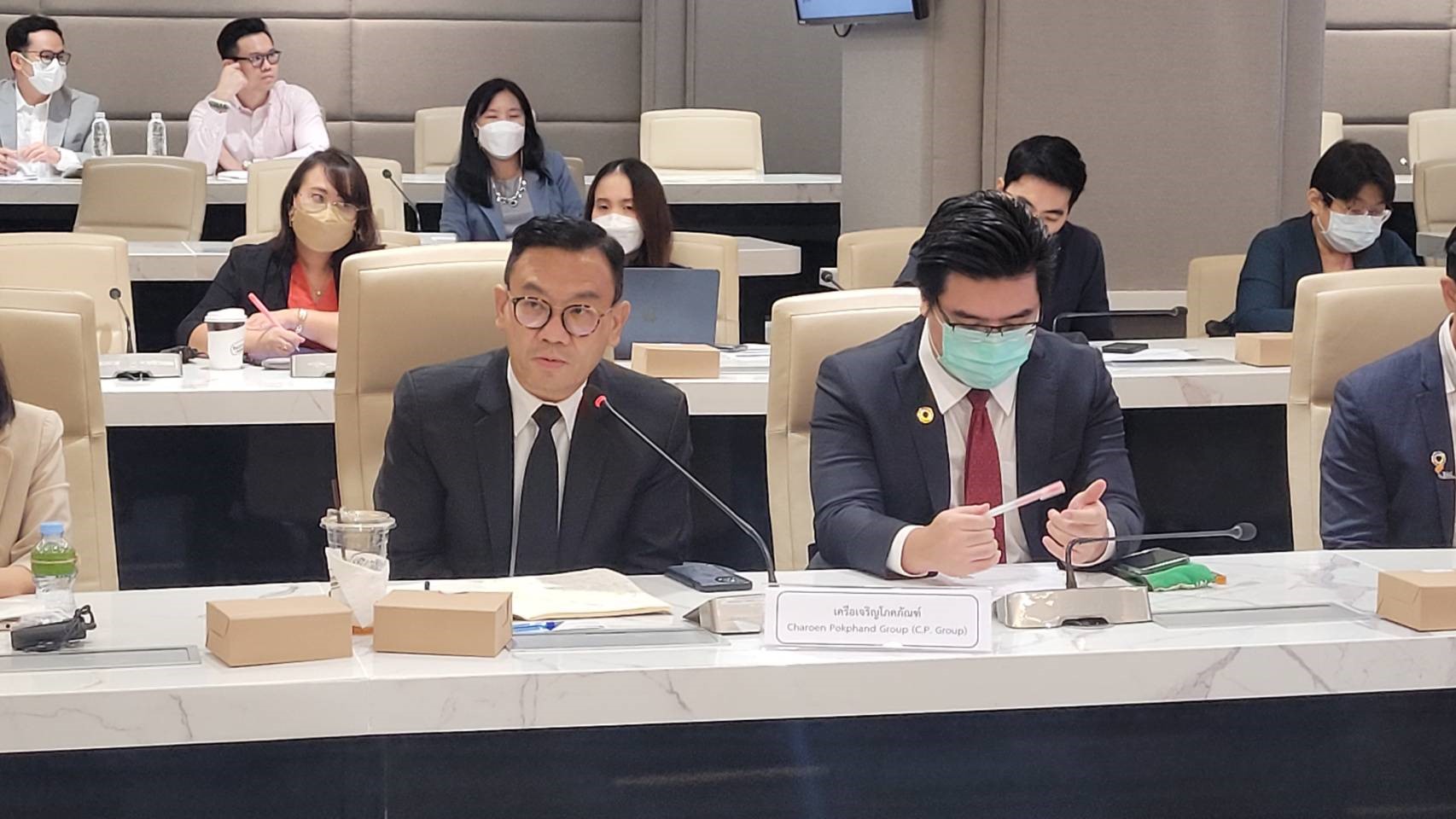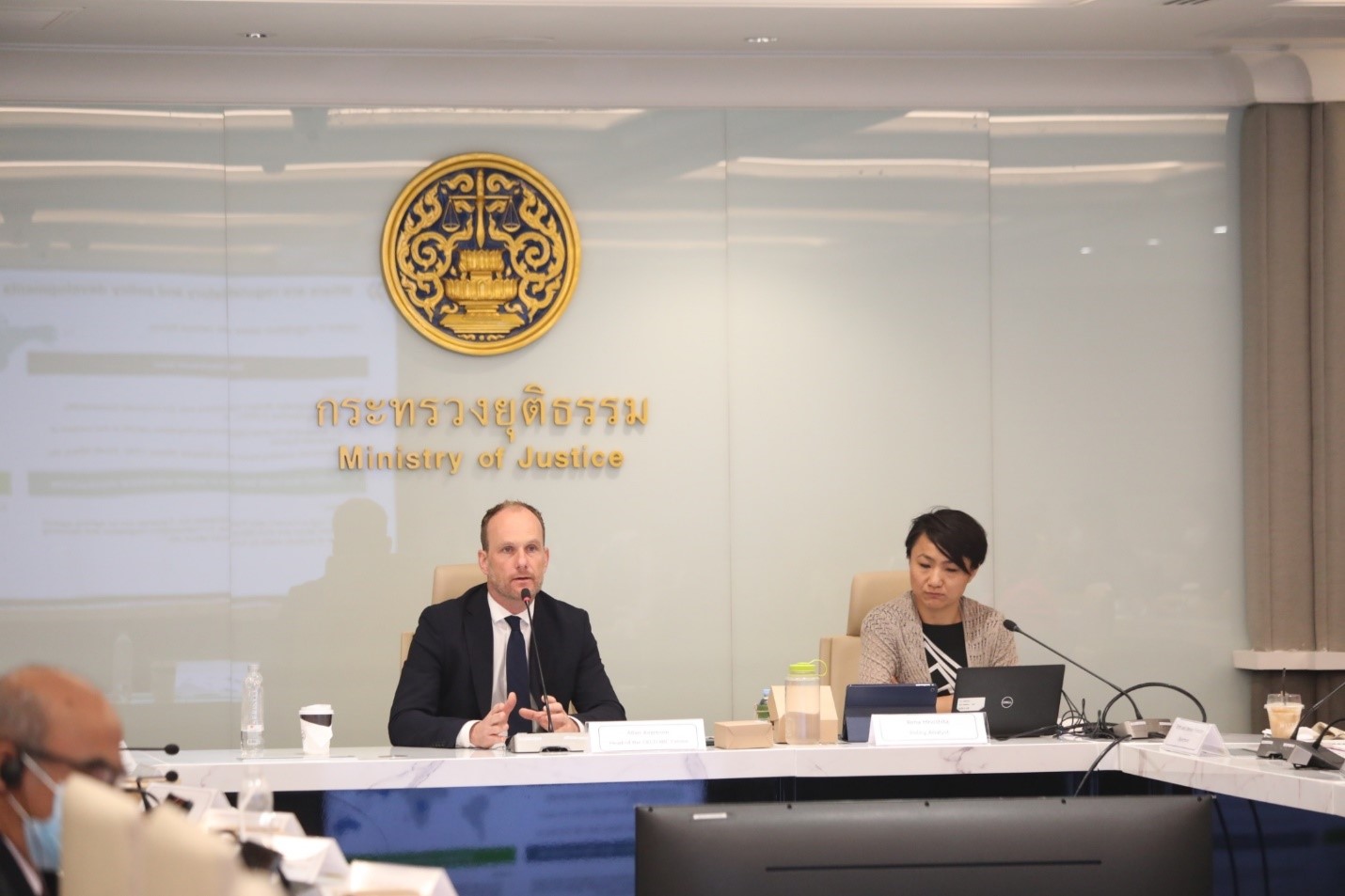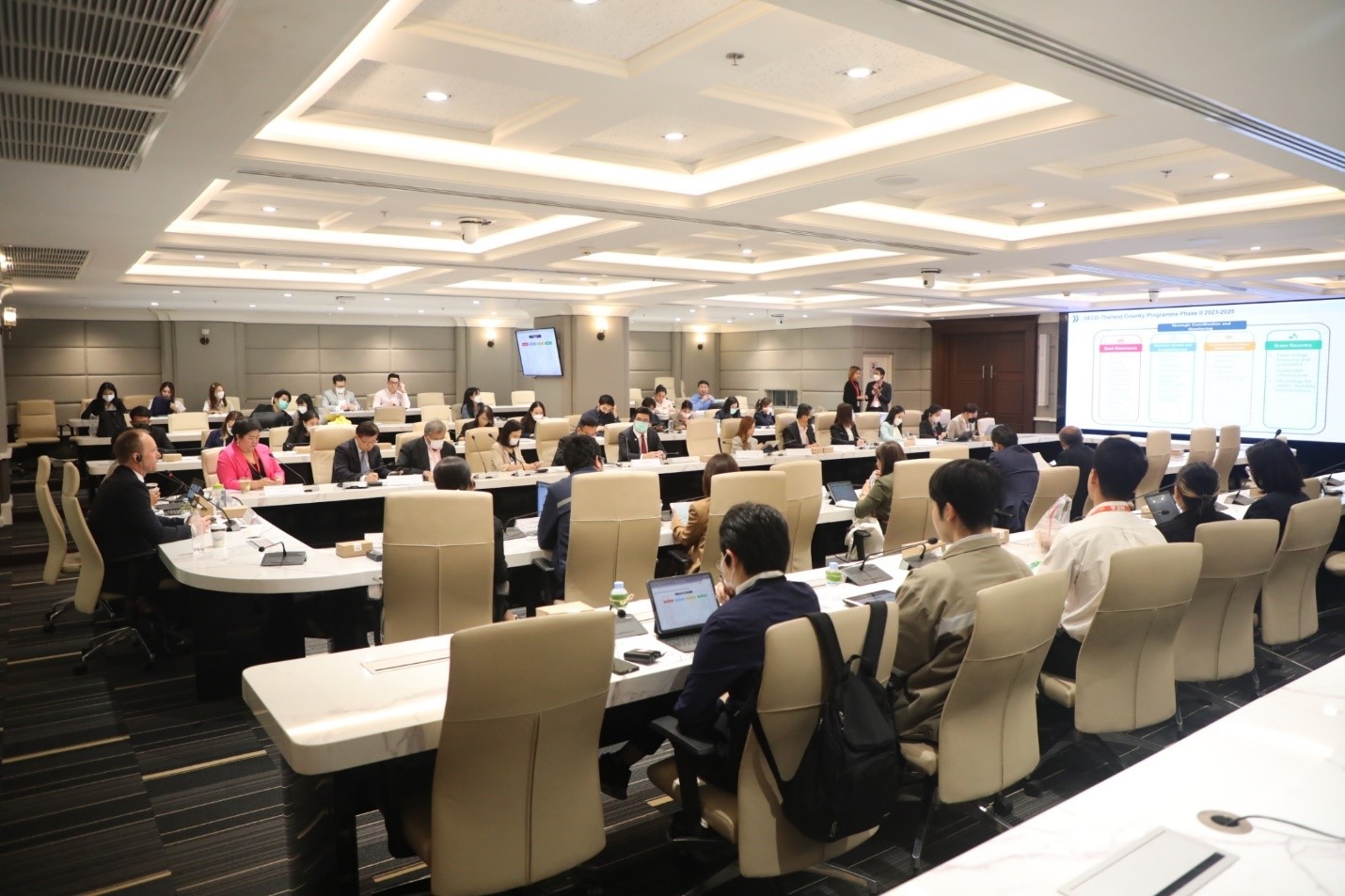
11 กรกฎาคม 2566 – ดร. เนติธร ประดิษฐ์สาร ผู้ช่วยบริหาร ประธานคณะผู้บริหาร รองกรรมการผู้จัดการอาวุโส สำนักความร่วมมือระหว่างประเทศด้านความยั่งยืนและสื่อสารองค์กร ได้เข้าร่วมการหารือกับผู้แทนองค์การเพื่อความร่วมมือทางเศรษฐกิจและการพัฒนา (OECD) ภาคธุรกิจ และหน่วยงานรัฐวิสาหกิจ โดยกรมคุ้มครองสิทธิและเสรีภาพ กระทรวงยุติธรรม เป็นเจ้าภาพ การประชุมครอบคลุมสองประเด็นสำคัญ ได้แก่ แนวทางการดำเนินธุรกิจอย่างมีความรับผิดชอบ Responsible Business Conduct (RBC) ของ OECD รวมถึงแนวทางสำหรับองค์กรข้ามชาติ และโครงการสนับสนุนการมีโครงสร้างพื้นฐานที่อยู่ในภูมิภาคเอเชีย (SIPA) การประชุมนำโดย Mr. Allan Jorgensen หัวหน้าศูนย์ OECD RBC และ Ms. Rena Hinoshita นักวิเคราะห์นโยบาย ศูนย์ OECD RBC
การสนทนาเริ่มด้วยการนำเสนอสั้นๆ ของ Mr. Allan และ Ms. Rena ทั้งสองหัวข้อ ภายใต้หัวข้อ RBC เป็นที่ชัดเจนว่ากระบวนการการตรวจสอบสิทธิมนุษยชนรอบด้าน (HRDD) ไม่ได้เป็นเพียงทางเลือกสำหรับบริษัทที่ตั้งใจจะทำธุรกิจในต่างประเทศอีกต่อไป ด้วยการนำมาใช้ของกฎระเบียบใหม่ ซึ่งรวมถึงกฎหมายเกี่ยวกับแรงงานทาสในสหราชอาณาจักรและออสเตรเลีย และ Corporate Sustainability Due Diligence Directive ที่กำลังนำมาใช้ของสหภาพยุโรป โดยแนวปฏิบัติของ OECD มีขึ้นเพื่อสนับสนุนบริษัทต่างๆ ในการปฏิบัติตามกฎระเบียบเหล่านี้ โดยให้คำแนะนำการดำเนินการและ แนวทางปฏิบัติเกี่ยวกับการดำเนินธุรกิจอย่างมีความรับผิดชอบ นอกจากนี้ ในฐานะส่วนหนึ่งของความพยายามของ OECD ได้มีการผลักดันให้ SIPA ในการสนับสนุนการดำเนินการอย่างยั่งยืนในโครงสร้างพื้นฐานที่สอดคล้องกับข้อตกลงปารีสและเป้าหมายการพัฒนาอย่างยั่งยืนของสหประชาชาติ (UN SDGs)
ในการหารือครั้งนี้ ดร.เนติธร ประดิษฐ์สาร กล่าวชื่นชมความช่วยเหลือที่สำคัญที่ OECD ได้มอบให้ทั้งภาครัฐและเอกชนในประเทศไทย พร้อมทั้งให้คำแนะนำเกี่ยวกับแนวทาง OECD ดร. เนติธร แนะนำว่า OECD ต้องคำนึงถึงความท้าทายและโอกาสเฉพาะของแต่ละภาคส่วน โดยเฉพาะเมื่อพิจารณาการก่อสร้างโครงสร้างพื้นฐาน ขณะเดียวกันต้องแน่ใจว่ากลุ่มเปราะบางทั้งหมดมีส่วนร่วมอย่างเต็มที่และได้รับการคุ้มครองในกระบวนการนี้ นอกจากนี้ แนวปฏิบัติของ OECD จะต้องเป็นประโยชน์ในการช่วยให้บริษัทต่างๆ บรรลุการปฏิบัติตามกฎระเบียบทั้งในปัจจุบัน และในอนาคต เช่น EU Green Deal และยังต้องสอดคล้องกับเครื่องมือ แนวทาง และเป้าหมายที่มีอยู่ ซึ่งกำหนดโดยองค์กรอื่น ๆ
C.P. Group Joins Discussion with OECD on Responsible Business Conduct and Sustainable Infrastructure
July 11th, 2023 – Dr. Netithorn Praditsarn, Executive Assistant to Group CEO and Senior Vice President of the Global Partnership for Sustainability and Communications of Charoen Pokphand Group participated in a discussion between representatives of the Organization for Economic Cooperation and Development (OECD), Thai businesses and state-owned enterprises. Hosted by the Ministry of Justice’s Rights and Liberty Protection Department (RLPD), the discussion covered two important areas: the OECD’s Responsible Business Conduct (RBC) guidelines, including the OECD Guidelines for Multinational Enterprises, and the OECD’s Sustainable Infrastructure in Asia (SIPA) initiative. The discussion was led and facilitated by Mr. Allan Jorgensen, Head of the OECD RBC Center, and Ms. Rena Hinoshita, Policy Analyst at the OECD RBC Center.
The discussion was prefaced by Mr. Allan and Ms. Rena’s short presentation on the two subjects. Regarding RBC, it was becoming clear that human rights due diligence (HRDD) was no longer just optional for companies that intended to do business abroad; a litany of new regulations, including laws on modern slavery in the UK and Australia and the European Union’s upcoming Corporate Sustainability Due Diligence Directive. The OECD’s guidelines are meant to support companies in complying with these regulations by providing suggested actions and best practices regarding responsible business conduct. Furthermore, as part of the OECD’s efforts, they have pushed forward the Sustainable Infrastructure Programme in Asia (SIPA) as a way to support sustainable action in infrastructure, in line with the Paris Agreement and UN Sustainable Development Goals (UN SDGs).
In the following discussion, Dr. Netithorn Praditsarn commended the important assistance the OECD has lent both to the public and private sectors in Thailand, while also providing guidance on the OECD’s guidelines and initiatives. The OECD must take into account the challenges and opportunities unique to each sector, especially when considering infrastructure construction, while ensuring that all vulnerable groups are fully engaged and protected in the process. Furthermore, the OECD guidelines must be helpful in assisting companies reach compliance with not just current, but future regulations such as the EU Green Deal. It must also remain aligned with other available tools, guidelines, and targets established by other bodies, Dr. Netithorn said, while reiterating C.P. Group’s appreciation of OECD’s efforts.



